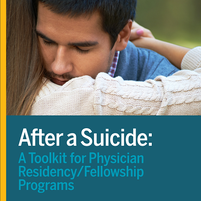Critical Incident Stress Debriefing Process
The Critical Incident Stress Debriefing process (CISD) is a well-researched model designed to mitigate the impact of life-threatening crises that require rescue or emergency care. These incidents evoke strong emotional responses from health care workers. Some of the responses produced are normal and some are pathological stress and grief reactions. The goal is to facilitate their return to routine functioning, and to prevent pathological responses to the trauma that is an inherent aspect of their profession.
Schwartz RoundsSchwartz Rounds are a place where people who don’t usually talk about the heart of the work are willing to share their vulnerability, to question themselves. These monthly interdisciplinary forums provide a opportunity for dialogue that does not usually happen anywhere else in the hospital.
|
|
Institutional Preparation for SuicideNobody thinks it will happen at their company, but when it does your leadership really needs to have a well thought out plan for handling a staff suicide compassionately and with wisdom. ACGME partnered with the American Foundation for Suicide Prevention to put together this comprehensive toolkit which could be adapted for any institution.
|
